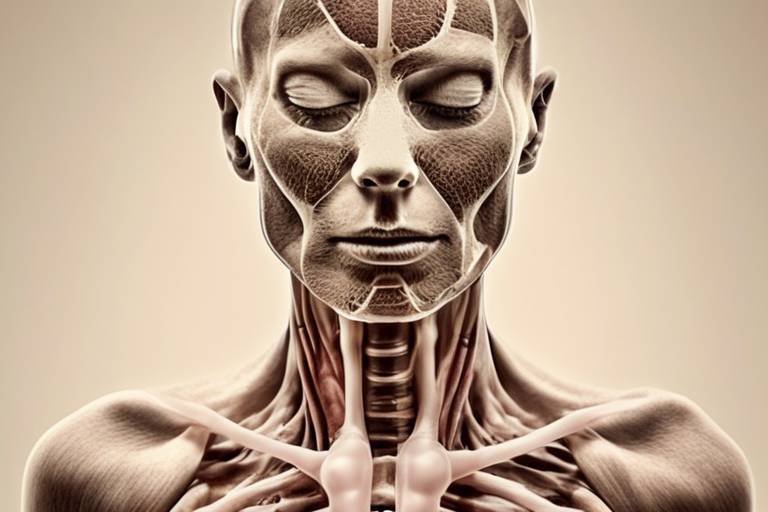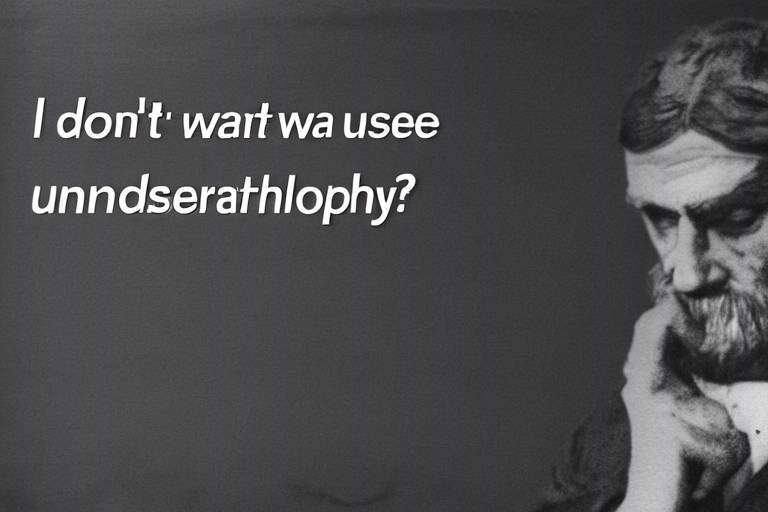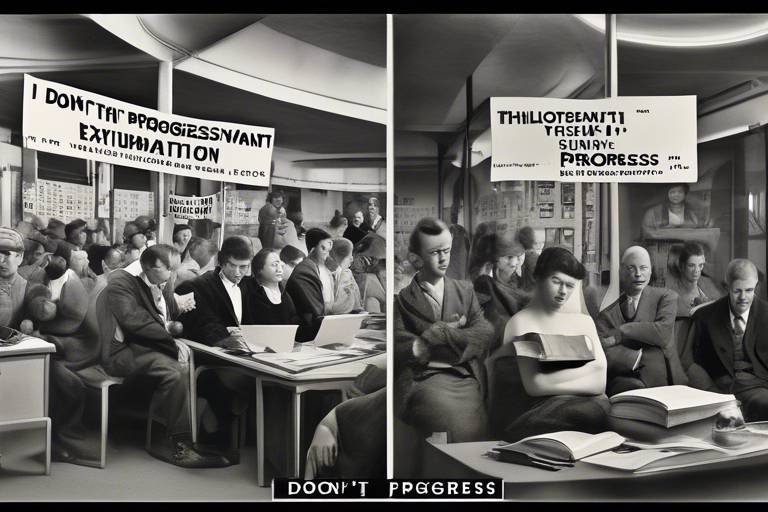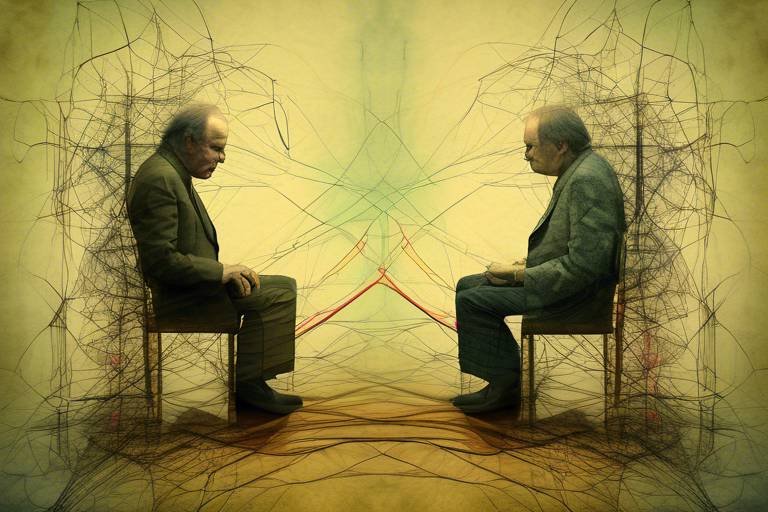The Philosophy of the Human Body
The intricate relationship between philosophy and the human body is a profound subject that has intrigued thinkers for centuries. From ancient times to modern discussions, the way we perceive our bodies shapes our understanding of existence, identity, and embodiment. It’s fascinating to consider how our physical form influences not just our self-perception, but also our interaction with the world around us. Have you ever thought about how your body acts as a vessel for your thoughts and emotions? This article will delve into various philosophical perspectives that illuminate this complex relationship, revealing how our understanding of the body has evolved over time.
To grasp the depth of philosophical thought surrounding the body, we must first explore how ancient philosophers viewed physical existence. Starting with Plato, who famously distinguished between the realm of forms and the physical world, we see the beginnings of a dualistic approach. Plato viewed the body as a temporary vessel for the soul, leading to a perception that the body was lesser than the mind. Fast forward to Descartes, who further cemented this divide with his assertion, "Cogito, ergo sum" (I think, therefore I am). This marked a significant shift in understanding embodiment, where the mind was elevated above the body, creating a legacy that would influence countless philosophical discussions.
The concept of mind-body dualism suggests a separation between mental and physical states, raising questions about consciousness and identity. This perspective posits that the mind is a non-physical entity, distinct from the body. But what does this mean for our understanding of ourselves? As we navigate through life, our experiences are deeply intertwined with our physical form. Contemporary philosophers challenge this separation, arguing that a more integrated approach is necessary to truly understand human experience.
René Descartes' contributions to philosophy cannot be overstated. His arguments for the distinction between mind and body laid the groundwork for modern philosophy. Descartes believed that the mind was a thinking substance, while the body was a physical substance. This dichotomy has shaped discussions around consciousness, raising questions about what it means to be truly 'alive' or 'aware.' His influence persists today, as philosophers continue to grapple with the implications of his work on our understanding of identity and existence.
Despite its historical significance, dualism has faced substantial critiques. Materialist perspectives argue that everything about consciousness can be explained through physical processes, suggesting that separation is an illusion. Phenomenological approaches, on the other hand, emphasize the lived experience of the body, advocating for a more holistic understanding of mind and body. They argue that our consciousness cannot be divorced from the physicality of our existence. This debate is crucial as it challenges us to reconsider how we define ourselves in relation to our bodies.
In light of scientific advancements, contemporary philosophers are reinterpreting the relationship between mind and body. The rise of neuroscience has provided insights into how brain activity correlates with mental states, suggesting that our understanding of consciousness is evolving. Modern discussions often focus on the interplay between the physical and the mental, recognizing that our experiences are shaped by both realms. This shift encourages a more nuanced view of embodiment, one that acknowledges the complexity of human experience.
Phenomenology approaches the body as a fundamental aspect of human experience. Think about it: our perceptions, emotions, and interactions are all mediated through our bodies. This philosophical perspective emphasizes that our consciousness is not just a product of the mind but is deeply rooted in our physical existence. The body is not merely a vessel; it actively shapes our understanding of the world. This approach invites us to explore how our embodied experiences inform our identity and consciousness.
Our understanding of the body is not only philosophical but also deeply influenced by societal norms and cultural contexts. Issues such as gender, race, and disability play significant roles in how we perceive our bodies and those of others. For instance, societal standards often dictate what is considered an 'ideal' body, leading to various forms of body politics and identity struggles. This intersection of philosophy and social constructs challenges us to reflect on how power dynamics shape our understanding of embodiment.
Feminist critiques of traditional philosophy have shed light on how women's experiences and bodies have often been marginalized. By questioning the male-centric narratives that dominate philosophical discourse, feminist philosophers advocate for a more inclusive understanding of embodiment. They highlight how societal expectations and norms can constrain women's identities and experiences, urging a reevaluation of how we think about the body in philosophical discussions.
The intersection of body politics and identity is a rich area of exploration. Power dynamics influence how bodies are perceived and treated in society. For example, marginalized groups often face discrimination based on their physical appearance, which can impact their sense of self and belonging. Understanding these dynamics is crucial for fostering a more equitable society. As we navigate these complex issues, we must consider how our philosophical frameworks can evolve to address the realities of body politics.
The ethical considerations surrounding the body are vast and complex. Topics such as bodily autonomy, medical ethics, and the implications of emerging technologies challenge us to think critically about our physical existence. What rights do we have over our bodies? How do we navigate the ethical dilemmas posed by advancements in medical technology? These questions are at the forefront of contemporary philosophical discussions, urging us to consider the moral implications of our choices.
Bodily autonomy is a fundamental concept in ethical debates, particularly in discussions around reproductive rights and consent. The right to make decisions about one's own body is essential for individual freedom and dignity. However, this autonomy is often contested in various social and political contexts. Philosophers argue that recognizing and protecting bodily autonomy is crucial for fostering a just society.
As technology advances, ethical implications regarding the human body become increasingly complex. Genetic engineering, prosthetics, and other technological interventions raise questions about what it means to be human. How do these advancements affect our understanding of identity and embodiment? As we embrace new technologies, we must consider their impact on our physical existence and the ethical responsibilities that come with them.
As we reflect on the ongoing evolution of body philosophy, it’s clear that emerging trends and interdisciplinary approaches will shape future discussions about the human body. The interplay between philosophy, science, and social constructs will continue to challenge our understanding of embodiment. As we navigate these complexities, it’s essential to remain open to new ideas and perspectives that enrich our understanding of ourselves and our place in the world.
- What is the main focus of body philosophy? Body philosophy explores the relationship between the mind and body, examining how our physical existence influences our understanding of identity and consciousness.
- How does historical perspective shape our understanding of the body? Historical perspectives provide context for how philosophical thought has evolved regarding the body, highlighting significant shifts from ancient to modern views.
- What are the implications of mind-body dualism? Mind-body dualism raises questions about consciousness and identity, suggesting a separation between mental and physical states that contemporary philosophers often critique.
- How do societal norms influence our perception of the body? Societal norms shape our understanding of the ideal body, impacting issues of body politics, identity, and the experiences of marginalized groups.
- What ethical considerations surround the body? Ethical considerations include bodily autonomy, medical ethics, and the implications of technological advancements on our understanding of human existence.

Historical Perspectives on Embodiment
When we dive into the , we embark on a fascinating journey through time, exploring how ancient thinkers grappled with the concept of the body. From the philosophical musings of Plato to the radical ideas of Descartes, the evolution of thought surrounding physical existence reveals much about our understanding of what it means to be human.
In ancient Greece, philosophers like Plato viewed the body as a mere vessel for the soul. He posited that the true essence of a person lies beyond the physical realm, in the world of forms—an abstract and eternal reality. This dualistic thinking set the stage for a long-standing debate about the relationship between the mind and body. Plato's allegory of the cave, for instance, illustrates how individuals often perceive only shadows of reality, suggesting that the body can obscure our understanding of higher truths.
Fast forward to the Enlightenment, and we encounter René Descartes, who famously declared, "I think, therefore I am." Descartes further entrenched the mind-body dualism by arguing that the mind is a non-material substance, fundamentally distinct from the body. He viewed the body as a machine, a concept that paved the way for modern science and medicine. But this perspective also raised critical questions: If the mind and body are separate, how do they interact? What does it mean for our identity if we are merely a collection of thoughts and physical parts?
This historical shift in understanding embodiment wasn't without its critics. Over the centuries, philosophers began to challenge the rigid separation of mind and body. The rise of materialism, for instance, argued that consciousness arises from physical processes within the brain, suggesting a more integrated approach to understanding human existence. The phenomenological perspective, emerging in the 20th century, further emphasized the lived experience of the body, highlighting how our physical presence shapes our perception of the world.
As we reflect on these historical perspectives, it becomes evident that our understanding of embodiment is not static; it evolves with our cultural and scientific advancements. The dialogue between ancient and modern thinkers continues to influence contemporary philosophy, prompting us to reconsider how we define ourselves in relation to our bodies. Are we simply our thoughts, or does our physical form play a crucial role in shaping our identity?
In summary, the historical perspectives on embodiment reveal a rich tapestry of ideas that challenge us to think critically about our existence. As we continue to explore this intricate relationship, we must ask ourselves: How do our beliefs about the body influence our daily lives, our relationships, and our sense of self?
- What is embodiment in philosophy? Embodiment refers to the way our physical bodies shape our experiences, perceptions, and understanding of the world around us.
- How did ancient philosophers view the body? Ancient philosophers, particularly Plato, often viewed the body as a temporary vessel for the soul, emphasizing a dualistic separation between mind and body.
- What is mind-body dualism? Mind-body dualism is the philosophical concept that the mind and body are distinct entities, with the mind being non-material and the body being a physical object.
- How has the understanding of embodiment evolved? Over time, thinkers have moved from strict dualism to more integrated views, considering how physical existence influences consciousness and identity.

Mind-Body Dualism
Mind-body dualism is a fascinating philosophical concept that has sparked debates and discussions for centuries. At its core, dualism posits that the mind and body are distinct entities, each with its own properties and functions. This idea can be traced back to ancient philosophers, but it was the French philosopher René Descartes who famously articulated this separation in the 17th century. Descartes argued that the mind, or soul, is a non-physical substance, while the body is a physical entity. This dichotomy raises profound questions about consciousness, identity, and the essence of being.
To grasp the implications of mind-body dualism, consider how it influences our understanding of consciousness. If the mind exists independently of the body, then what happens to our sense of self when our physical form deteriorates? This question invites us to explore the essence of identity. Are we merely our bodies, or is there something more profound that constitutes our being? These inquiries are not just philosophical musings; they have real-world implications, especially in areas like psychology, neuroscience, and even artificial intelligence.
Despite its historical significance, dualism has faced considerable criticism in contemporary philosophy. Many thinkers argue that the separation of mind and body is overly simplistic and fails to account for the complex interplay between the two. For instance, materialist philosophers contend that mental states are entirely dependent on physical states. They assert that our thoughts, feelings, and consciousness arise from brain activity, challenging the notion of a separate, non-physical mind.
Furthermore, the rise of phenomenology has introduced a new perspective on embodiment. Phenomenologists argue that our experiences and perceptions are fundamentally shaped by our physical existence. Instead of viewing the mind and body as separate, they emphasize the importance of understanding how our bodily experiences inform our consciousness. This approach invites us to reconsider the traditional dualist framework and encourages a more integrated understanding of human experience.
In light of these critiques, modern philosophers are reinterpreting dualism to accommodate scientific advancements and a deeper understanding of human experience. For instance, some propose a non-reductive physicalism, which suggests that while mental states are rooted in physical processes, they cannot be fully explained by them. This perspective acknowledges the richness of our subjective experiences while still recognizing the biological basis of our existence.
Ultimately, the discussion surrounding mind-body dualism is far from settled. As we delve deeper into the mysteries of consciousness and the nature of existence, it becomes increasingly clear that our understanding of the mind and body will continue to evolve. The interplay between philosophy and science will likely yield new insights that challenge our preconceived notions of what it means to be human.
- What is mind-body dualism?
Mind-body dualism is the philosophical concept that posits the mind and body as two distinct entities, each with its own properties. - Who is the main philosopher associated with dualism?
René Descartes is the most notable philosopher associated with mind-body dualism. - What are some critiques of dualism?
Critics argue that dualism oversimplifies the relationship between mind and body and that consciousness is deeply intertwined with physical processes. - How does phenomenology relate to dualism?
Phenomenology emphasizes the significance of bodily experiences in shaping consciousness, challenging the traditional dualist view.

Descartes' Influence
René Descartes, often hailed as the father of modern philosophy, made significant contributions to our understanding of the relationship between the mind and body. His famous dictum, "Cogito, ergo sum" (I think, therefore I am), encapsulates his belief in the primacy of the mind over the body. For Descartes, the mind was an immaterial substance, distinct from the physical body, which he viewed as a mere machine. This radical separation laid the groundwork for what we now refer to as mind-body dualism, a concept that has sparked extensive debate and inquiry in both philosophy and science.
Descartes posited that the mind is the essence of human identity—our thoughts, consciousness, and self-awareness define our existence. In contrast, the body was seen as a temporary vessel, subject to the laws of physics and biology. This dichotomy has profound implications for our understanding of consciousness and identity. It raises questions such as: Are we merely our thoughts, or is our physical experience equally vital to our identity? Descartes' influence extends beyond philosophy; it has permeated various fields, including psychology and neuroscience, prompting further exploration of how the mind interacts with the body.
Despite the clarity of Descartes' arguments, his dualism has faced significant critiques. Critics argue that his separation of mind and body oversimplifies the complex interactions between the two. For instance, emerging fields like neuroscience suggest that our thoughts and emotions are deeply intertwined with our physical states. The mind does not operate in a vacuum; it is influenced by our biological makeup, environmental factors, and social contexts. This holistic view challenges the Cartesian perspective and encourages a more integrated understanding of human experience.
Moreover, Descartes’ influence can be seen in the ongoing discussions about identity and consciousness. His ideas have led to various interpretations and adaptations, particularly in the context of modern advancements in technology and psychology. For example, the rise of artificial intelligence and virtual reality raises new questions about what it means to be human. Are our thoughts and consciousness still the defining factors of our identity in a world where technology can simulate these experiences?
In summary, while Descartes laid the foundation for mind-body dualism, his influence has sparked a myriad of discussions about the nature of existence, identity, and the intricate relationship between our mental and physical selves. As we continue to explore these questions, it becomes increasingly clear that understanding the human experience requires a nuanced approach that transcends the simplistic separation of mind and body.
- What is mind-body dualism?
Mind-body dualism is the philosophical concept that the mind and body are distinct and separate entities. This view was famously articulated by René Descartes. - How did Descartes influence modern philosophy?
Descartes' emphasis on rational thought and skepticism laid the groundwork for modern philosophy, encouraging critical thinking and questioning of established norms. - What are some critiques of Descartes' dualism?
Critics argue that dualism oversimplifies the relationship between mind and body, ignoring the complex interactions that occur between our mental and physical states. - How do contemporary philosophers view Descartes' ideas?
Many contemporary philosophers seek to integrate Descartes' insights with modern scientific understanding, advocating for a more holistic view of human experience.

Critiques of Dualism
The concept of mind-body dualism, while historically significant, has faced substantial critiques from various philosophical perspectives. Critics argue that the strict separation of mind and body oversimplifies the complex relationship between our mental states and physical existence. For instance, materialist philosophers contend that everything about human experience can be explained through physical processes, suggesting that the mind is not a distinct entity but rather a product of brain activity. This perspective challenges the notion that consciousness exists independently of the body, positing instead that our thoughts, emotions, and identities are deeply intertwined with our physical form.
Another compelling critique comes from phenomenology, which emphasizes the importance of embodied experience. Phenomenologists argue that our perception of the world is fundamentally shaped by our bodily interactions with it. For example, when we experience joy or pain, these sensations are not just mental states; they are felt through our bodies. This perspective highlights that the body is not merely a vessel for the mind but an integral part of what it means to be human. In this view, to separate mind from body is to overlook the richness of lived experience.
Moreover, the feminist critique of dualism raises important questions about how traditional philosophical frameworks often marginalize women's experiences. Feminist philosophers argue that the mind-body split has historically contributed to the devaluation of women's bodily experiences and identities. By emphasizing rationality and intellect as superior to the physical, traditional dualism can perpetuate harmful stereotypes about femininity, reinforcing societal norms that prioritize male experiences over female ones.
In addition to these critiques, contemporary philosophers are increasingly exploring the implications of advances in neuroscience and cognitive science, which reveal that mental processes are deeply rooted in physical brain activity. This emerging understanding suggests a more integrated approach to the mind-body relationship, where consciousness is seen as a product of complex biological systems rather than a separate, ethereal entity. As we continue to delve into the intricacies of human existence, the critiques of dualism remind us that our understanding of the mind and body must evolve in tandem with our growing knowledge of both philosophy and science.
In summary, the critiques of dualism underscore a fundamental shift in how we view the relationship between mind and body. By embracing a more holistic approach, we can better appreciate the interconnectedness of our physical and mental experiences, leading to a richer understanding of what it means to be human.
- What is mind-body dualism? Mind-body dualism is the philosophical concept that the mind and body are two distinct entities that interact but are fundamentally different in nature.
- Who are the main critics of dualism? Critics include materialist philosophers, phenomenologists, and feminist theorists, each offering unique perspectives on the limitations of dualism.
- How does phenomenology challenge dualism? Phenomenology emphasizes that our bodily experiences shape our consciousness, arguing that the mind cannot be separated from the body.
- What role does neuroscience play in critiques of dualism? Neuroscience provides evidence that mental processes are rooted in brain activity, suggesting a more integrated view of mind and body.

Modern Reinterpretations
In the ever-evolving landscape of philosophy, the relationship between the mind and body has undergone significant reinterpretation, especially in light of recent scientific advancements. Philosophers today are grappling with questions that challenge traditional dualistic views, seeking a more integrated understanding of our existence. This shift is not just academic; it resonates with our everyday experiences, as we navigate a world where technology and biology intertwine like never before.
One of the key areas of modern reinterpretation is the rise of embodied cognition. This theory posits that our cognitive processes are deeply rooted in the body's interactions with the environment. In other words, our thoughts and perceptions are not merely products of the mind but are influenced by our physical experiences. Imagine trying to solve a puzzle while standing on a moving train; your body’s instability impacts your ability to concentrate. This analogy illustrates the core concept that cognition is not isolated in the brain but is a dynamic interplay between mind and body.
Moreover, contemporary philosophers are increasingly drawing from neuroscience and psychology to inform their discussions on embodiment. The insights gained from these fields challenge the Cartesian view of a strict separation between mind and body. For instance, research has shown how physical states—such as posture and movement—can significantly affect our emotional and cognitive states. This has led to a burgeoning interest in practices like mindfulness and somatic therapies, which emphasize the importance of bodily awareness in achieving mental clarity.
Another fascinating development is the exploration of technology's role in shaping our understanding of embodiment. With the advent of virtual reality (VR) and augmented reality (AR), the boundaries of our physical existence are being redefined. These technologies allow us to experience alternate realities, prompting questions about the nature of identity and presence. For example, when you don a VR headset, your body feels present in a digital realm. Does this mean your sense of self extends beyond your physical form? Such inquiries push us to reconsider the essence of being human in an increasingly digital world.
Furthermore, modern interpretations often emphasize the importance of interconnectedness—not just between mind and body, but also among individuals and their communities. Philosophers are recognizing that our bodies are situated within larger social and cultural contexts that shape our identities and experiences. This perspective encourages a more holistic view, acknowledging how factors like race, gender, and socio-economic status influence our bodily experiences and perceptions.
As we delve deeper into these modern reinterpretations, it becomes clear that the dialogue surrounding the mind-body relationship is far from settled. Each new insight invites us to question and expand our understanding of what it means to be human. The interplay of philosophy, science, and technology continues to enrich this discourse, offering new avenues for exploration and understanding.
- What is embodied cognition? Embodied cognition is a theory suggesting that cognitive processes are influenced by our physical interactions with the environment, emphasizing the connection between mind and body.
- How does technology impact our understanding of the body? Technologies like VR and AR challenge traditional notions of embodiment, allowing us to explore alternate realities and prompting questions about identity and presence.
- Why is interconnectedness important in modern philosophy? Interconnectedness highlights how our bodily experiences are shaped by social and cultural contexts, encouraging a more holistic understanding of identity.

Embodiment in Phenomenology
When we dive into the realm of phenomenology, we uncover a fascinating perspective on the human body that challenges traditional philosophical views. Unlike the dualistic separation of mind and body, phenomenology emphasizes the body as a core element of our lived experience. Think of it this way: our body is not just a vessel carrying our mind around; it’s an integral part of how we perceive and interact with the world. Imagine trying to understand a symphony without ever hearing the music—our bodily sensations and movements are akin to the notes that create the melody of our existence.
The philosopher Edmund Husserl, often regarded as the father of phenomenology, argued that we must return to the "things themselves" to truly grasp human experience. This approach invites us to consider how our bodies shape our perceptions, emotions, and interactions. For instance, when we touch something warm, it’s not just a sensory input; it’s a full-bodied experience that evokes feelings and memories. Our body becomes a bridge linking us to the world around us, making embodiment a central theme in phenomenological thought.
Furthermore, phenomenology posits that our relationship with our body is inherently intertwined with our sense of self. We don’t just have a body; we are our body. This idea can be illustrated through the following points:
- Perception: Our sensory experiences are filtered through our bodily existence. How we see, hear, and feel is all mediated by our physical form.
- Action: Every movement we make is a reflection of our intentions and desires, showcasing the body as an active participant in our lives.
- Identity: Our body contributes significantly to our identity, influencing how we see ourselves and how others perceive us.
The embodiment perspective in phenomenology also raises questions about the nature of consciousness. Rather than viewing consciousness as something separate from the body, phenomenologists argue that it is deeply embedded in our physical existence. This leads to a more holistic understanding of what it means to be human. In this light, consciousness isn’t just a mental phenomenon; it’s a lived experience that occurs through our bodies.
Additionally, the implications of this embodied perspective extend into various fields, such as psychology, sociology, and even art. For example, in therapy, understanding a client’s bodily experiences can lead to deeper insights into their emotional state. In art, the embodiment of experience can inspire works that resonate on a physical and emotional level, inviting viewers to engage with their own bodily experiences.
In conclusion, the phenomenological approach to embodiment invites us to reconsider the role of the body in shaping our experiences and understanding of the world. It challenges us to recognize that our physical presence is not merely an accessory to our mental processes but rather a fundamental aspect of our existence. By embracing this perspective, we can cultivate a richer understanding of what it means to be human, one that honors the intricate dance between body, mind, and world.
- What is phenomenology? Phenomenology is a philosophical approach that focuses on the structures of experience and consciousness, emphasizing the importance of the body in shaping our perceptions.
- How does embodiment influence our identity? Our bodily experiences contribute significantly to our sense of self and how we interact with the world, shaping our identity in profound ways.
- Why is the body considered essential in phenomenology? The body is seen as an integral part of our lived experience, influencing our perceptions, emotions, and actions, thus playing a crucial role in understanding consciousness.

Social Constructs of the Body
The body is not just a physical entity; it is a canvas upon which society paints its norms, values, and expectations. These social constructs shape our perceptions of beauty, health, and identity, influencing how we view ourselves and others. For instance, consider the way different cultures celebrate varying body types. In some societies, a fuller figure is seen as a sign of wealth and prosperity, while in others, slenderness is idolized as the epitome of beauty. This diversity underscores how our understanding of the body is deeply intertwined with cultural narratives.
Moreover, the body becomes a battleground for issues of gender, race, and disability. Each of these categories carries its own set of societal expectations and biases. For example, the feminist movement has highlighted how women's bodies have often been objectified and subjected to unrealistic standards. The notion of the "ideal woman" is frequently defined by societal pressures, which can lead to harmful consequences, such as body image issues and eating disorders. Similarly, individuals from marginalized racial groups may find their bodies politicized, with their physical appearance influencing their treatment in society.
In contemporary discussions, the concept of body politics emerges as a critical lens through which we can examine these issues. Body politics refers to the ways in which power dynamics and societal structures influence our understanding of the body. It invites us to ask questions like: Who has the authority to define what is considered a 'normal' body? How do societal norms dictate our health choices? The answers to these questions reveal the often invisible forces that shape our relationship with our bodies.
Furthermore, the rise of social media has amplified these constructs, creating a platform for both positive and negative body image narratives. On one hand, social media can foster communities that celebrate body positivity and diversity. On the other hand, it can perpetuate harmful stereotypes and unrealistic beauty standards, leading to a culture of comparison and self-doubt. The challenge lies in navigating these complex dynamics and fostering a more inclusive understanding of the body.
As we delve deeper into these constructs, it becomes evident that the body is not merely a biological entity but a social one, influenced by a myriad of factors. By acknowledging the social constructs surrounding the body, we can begin to dismantle harmful norms and advocate for a more inclusive and equitable understanding of embodiment.
- What are social constructs of the body?
Social constructs of the body refer to the societal norms, values, and expectations that shape our perceptions and attitudes towards physical appearance, health, and identity. - How do cultural differences affect body image?
Cultural differences significantly influence body image, as various cultures have distinct ideals of beauty and health, which can lead to differing perceptions of body types. - What is body politics?
Body politics examines how power dynamics and societal structures impact our understanding and treatment of bodies, highlighting issues related to gender, race, and disability. - How has social media impacted body image?
Social media can both positively and negatively affect body image by promoting body positivity or perpetuating unrealistic beauty standards, respectively.

Feminist Philosophy and the Body
Feminist philosophy has profoundly reshaped our understanding of the body, challenging traditional notions that have often marginalized women's experiences. Historically, women’s bodies have been viewed through a lens of objectification and subordination, reducing their existence to mere physicality. Feminist thinkers argue that this perspective not only devalues the lived experiences of women but also perpetuates harmful stereotypes and societal norms.
At the core of feminist philosophy is the idea that the body is not just a biological entity but is deeply intertwined with identity, culture, and power dynamics. Feminists assert that the body is a site of political struggle, where issues of autonomy, agency, and representation come into play. For instance, the way society perceives and treats women's bodies can influence everything from healthcare access to personal freedom. This intersection of body and politics invites us to consider questions such as:
- How do societal expectations shape our understanding of femininity and masculinity?
- In what ways do cultural representations of the body affect women's self-esteem and identity?
- How can feminist philosophy empower women to reclaim their bodies and narratives?
Feminist philosophers like Simone de Beauvoir and Judith Butler have been instrumental in articulating these ideas. De Beauvoir famously stated, “One is not born, but rather becomes, a woman,” highlighting the social construction of gender and its implications for the body. Butler further expanded this discussion by introducing the concept of gender performativity, suggesting that gender is not an inherent quality but rather something that is enacted through behaviors and societal norms.
Moreover, feminist philosophy also critiques the medicalization of women's bodies. Many feminist theorists argue that the medical establishment often treats women's bodies as sites of pathology rather than as complex, self-regulating systems. This critique opens the door for discussions about bodily autonomy, advocating for the right of individuals to make informed decisions about their own bodies without external interference.
In recent years, the dialogue surrounding the body has expanded to include discussions on race, disability, and sexuality, further enriching feminist philosophy. The concept of intersectionality, introduced by Kimberlé Crenshaw, emphasizes that experiences of oppression are interconnected, and thus, the way one experiences their body can vary greatly depending on their social identities. This nuanced perspective allows for a more comprehensive understanding of how various factors shape our bodily experiences.
As we continue to explore feminist philosophy and the body, it becomes clear that the conversation is far from over. The ongoing debates about body image, reproductive rights, and the impact of technology on our physical selves are just a few examples of how this field remains dynamic and relevant. Feminist philosophy encourages us to question, challenge, and ultimately redefine our understanding of the body, making it a vital aspect of contemporary discourse.
- What is feminist philosophy? Feminist philosophy is a branch of philosophy that examines the ways in which gender influences our understanding of various philosophical concepts, including ethics, politics, and the body.
- How does feminist philosophy relate to the body? Feminist philosophy critiques traditional views of the body that often marginalize women's experiences and advocates for a more nuanced understanding of how bodies are shaped by societal norms and power dynamics.
- Who are some key figures in feminist philosophy? Notable feminist philosophers include Simone de Beauvoir, Judith Butler, and bell hooks, who have all contributed significantly to discussions about gender, identity, and the body.
- What is intersectionality? Intersectionality is a framework for understanding how various forms of social stratification, such as race, gender, and class, intersect and influence individual experiences and identities.

Body Politics and Identity
The concept of body politics delves into the intricate relationship between our physical forms and the identities we construct within societal frameworks. It’s fascinating how our bodies are not merely vessels for existence; they are also powerful symbols that communicate our identities, affiliations, and experiences. In contemporary society, the politics surrounding the body can be seen as a reflection of broader social dynamics, where issues of race, gender, and ability play significant roles in shaping our understanding of identity.
When we talk about body politics, we often consider how societal norms dictate what is deemed acceptable or desirable. For instance, beauty standards can vary dramatically across cultures and eras, influencing how individuals perceive themselves and each other. The pressure to conform to these standards can lead to a myriad of consequences, including body dysmorphia, low self-esteem, and even health issues. This is particularly evident in how different groups navigate their identities within these confines.
The intersectionality of identity politics is crucial here. Intersectionality refers to the way various social identities—such as race, gender, and class—interact and create overlapping systems of discrimination or disadvantage. For example, a Black woman may experience body politics differently than a white woman, as her identity is shaped by both her race and gender. This complexity highlights the importance of understanding how multiple identities can influence one’s experience of bodily autonomy and societal acceptance.
Moreover, body politics extends to discussions about healthcare access and the representation of marginalized bodies in media. The portrayal of bodies in films, advertisements, and social media can either challenge or reinforce societal norms. For instance, movements advocating for body positivity aim to celebrate diverse body types and challenge the traditional notions of beauty. This cultural shift not only empowers individuals but also encourages a broader dialogue about acceptance and identity.
In the realm of politics, body autonomy becomes a critical issue. The rights to control one’s own body—whether it’s about reproductive rights, gender identity, or healthcare decisions—are often contested in public discourse. The debates surrounding these topics are not just personal; they are political, as they involve laws, policies, and societal attitudes that can significantly impact individuals’ lives. The fight for bodily autonomy is a fight for identity, as it allows individuals to express and define who they are without external imposition.
To further illustrate the significance of body politics in shaping identity, consider the following table that highlights key aspects of how body politics interacts with identity formation:
| Aspect | Impact on Identity |
|---|---|
| Beauty Standards | Influences self-esteem and societal acceptance |
| Healthcare Access | Affects bodily autonomy and personal agency |
| Media Representation | Shapes perceptions of normalcy and desirability |
| Legal Rights | Determines control over one’s own body and identity expression |
Ultimately, the conversation surrounding body politics and identity is vital in understanding how we navigate our existence in a world filled with social constructs. As we continue to engage in these discussions, it becomes clear that our bodies are not just physical entities but are deeply intertwined with our identities, experiences, and the societal structures that shape our lives. The ongoing dialogue about body politics encourages us to reflect on our own identities and the ways we can advocate for a more inclusive understanding of what it means to inhabit a body in today's world.
- What is body politics? Body politics refers to the ways in which societal norms and power dynamics shape our understanding of the body and identity.
- How does body politics relate to identity? Body politics influences how individuals perceive themselves and their identities based on societal expectations, norms, and cultural representations.
- Why is bodily autonomy important? Bodily autonomy is crucial for individuals to control their own bodies and make decisions regarding their health, identity, and personal rights.
- What role does representation play in body politics? Representation in media and culture can either challenge or reinforce societal norms, impacting how different bodies and identities are perceived and accepted.

Ethics of the Body
The is a fascinating field that delves into the moral implications of how we treat our bodies and the bodies of others. In a world where technology and medicine are advancing at breakneck speed, questions about bodily autonomy, rights, and the ethical treatment of individuals have never been more pressing. It's like standing at the crossroads of science fiction and reality, where every choice we make about our bodies can ripple through society in profound ways.
At the heart of this discussion is the concept of bodily autonomy, which asserts that individuals have the right to govern what happens to their own bodies. This principle is crucial in debates surrounding reproductive rights, where the question of whether a woman has the right to make decisions about her own body is fiercely contested. The implications extend beyond just reproductive rights; they touch on issues like consent, medical procedures, and even the right to die. Imagine if your body were a canvas, and every decision you make about it is a brushstroke that defines your identity and autonomy.
Another critical aspect of the ethics of the body is the impact of technological interventions. As we venture into realms like genetic engineering, artificial intelligence, and prosthetics, we must grapple with the ethical ramifications of these advancements. For instance, consider the following questions:
- What does it mean to alter our genetic makeup?
- How do we ensure that technological advancements are accessible to all, and not just a privileged few?
- What ethical considerations arise when we enhance human capabilities through technology?
These questions are not just theoretical; they have real-world implications that can affect everything from healthcare policy to personal identity. As we navigate these complex ethical landscapes, we must also consider the voices and experiences of marginalized groups, ensuring that discussions about the body are inclusive and representative.
Moreover, the rise of body politics highlights how power dynamics influence our understanding of the body. From societal norms that dictate what is considered an 'ideal' body to the ways in which different bodies are treated in various cultural contexts, the ethics of the body is deeply intertwined with issues of justice and equality. For instance, the stigmatization of certain bodies—whether due to race, gender, or disability—raises important ethical questions about how we value different lives and experiences.
In summary, the ethics of the body is a rich and evolving field that challenges us to think critically about our relationship with our own bodies and those of others. As we confront new ethical dilemmas brought about by technological advancements and societal changes, it’s essential to engage in ongoing dialogue that respects individual rights while considering the broader implications for our communities.
- What is bodily autonomy? Bodily autonomy refers to the right of individuals to make decisions about their own bodies without external interference.
- How do technological advancements impact body ethics? Technological advancements raise ethical questions about consent, accessibility, and the definition of what it means to be human.
- Why are body politics important in ethical discussions? Body politics highlight how power dynamics affect our understanding of bodies, influencing societal norms and treatment of individuals.

Bodily Autonomy and Rights
Bodily autonomy is a concept that resonates deeply within the fabric of ethical debates today. It refers to the right of individuals to govern what happens to their own bodies without external interference. This principle is crucial in various discussions, particularly in the realms of reproductive rights, healthcare, and personal freedom. Imagine your body as your own personal kingdom; you are the sovereign ruler, and no one else should have the power to dictate how you govern it. This idea isn't just philosophical; it has real-world implications that affect people's lives daily.
At its core, bodily autonomy emphasizes the importance of consent. Whether it's about making decisions regarding medical treatments, reproductive choices, or even the right to refuse certain interventions, the principle remains the same: individuals should have the ultimate say over their own bodies. This concept challenges traditional views where authority figures—be it governments, medical professionals, or societal norms—often dictate what is best for individuals. The fight for bodily autonomy can be seen as a fight for personal freedom and human rights.
In recent years, we have witnessed significant movements advocating for bodily autonomy. For example, the debates surrounding abortion rights and contraceptive access have brought the topic into the spotlight. Many argue that denying individuals the right to make decisions about their reproductive health is a violation of their bodily autonomy. Similarly, issues surrounding gender identity and trans rights highlight the necessity for individuals to have control over their own bodies, including the right to undergo medical procedures that align with their gender identity.
Furthermore, the conversation around bodily autonomy extends to marginalized communities, where systemic inequalities often dictate who gets to exercise this right. For instance, women, people of color, and individuals with disabilities frequently face barriers that limit their autonomy. The intersectionality of these issues is crucial; it reveals how various forms of oppression can compound, making it even more difficult for certain groups to claim their rights over their bodies.
In light of technological advancements, the ethical considerations surrounding bodily autonomy are becoming increasingly complex. Innovations such as genetic engineering and biotechnology raise questions about how we can respect individual autonomy while also navigating the potential for misuse or harm. Should individuals have the right to alter their genetic makeup? What are the implications of such decisions for future generations? These questions are at the forefront of contemporary ethical discussions, illustrating the need for a nuanced understanding of bodily autonomy in the age of technology.
As we navigate these multifaceted issues, it becomes clear that bodily autonomy is not merely a personal issue; it is a societal one that requires collective engagement. Advocating for bodily autonomy means standing up for the rights of individuals to make informed choices about their own bodies, free from coercion or discrimination. It is a call for respect, dignity, and the recognition of each person's right to self-determination.
- What is bodily autonomy? Bodily autonomy is the right of individuals to make decisions about their own bodies without external interference.
- Why is bodily autonomy important? It is essential for personal freedom and human rights, allowing individuals to govern their own health and reproductive choices.
- How does bodily autonomy relate to reproductive rights? Bodily autonomy is central to discussions about reproductive rights, as it emphasizes the importance of consent in decisions about pregnancy and healthcare.
- What challenges do marginalized communities face regarding bodily autonomy? Marginalized communities often encounter systemic barriers that limit their ability to exercise bodily autonomy, including discrimination and lack of access to healthcare.

Technological Interventions
In today's rapidly evolving world, the intersection of technology and the human body has sparked a fascinating dialogue about what it means to be human. range from simple enhancements to complex modifications, all aimed at improving or altering our physical existence. But what does this mean for our understanding of identity, ethics, and our very essence as human beings?
As we delve into this topic, it's crucial to recognize that technological advancements have opened doors to possibilities once confined to the realm of science fiction. Imagine a world where genetic engineering allows us to eliminate hereditary diseases or where advanced prosthetics enable individuals to regain mobility and independence. These innovations can be life-changing, but they also raise profound ethical questions about the implications of altering our bodies.
One area of significant concern is the concept of bodily autonomy. With the rise of technologies such as CRISPR and biohacking, we must ask ourselves: who has the right to modify the body? Is it the individual, the medical professionals, or society at large? The debate intensifies when we consider the potential for inequality. If only a segment of the population can access these technologies, does that create a new class of individuals, fundamentally different from those who cannot?
Moreover, the introduction of wearable technology has transformed our relationship with our bodies. Devices that monitor our health metrics, from heart rate to sleep patterns, empower us to take charge of our well-being. However, this also leads to a new layer of scrutiny and pressure to conform to societal health standards. Are we enhancing our lives, or are we merely subjecting ourselves to constant evaluation and comparison?
To illustrate the impact of technological interventions, consider the following table that outlines some common interventions and their potential implications:
| Intervention | Description | Ethical Considerations |
|---|---|---|
| Genetic Engineering | Modification of genes to prevent diseases. | Who decides which traits are desirable? |
| Prosthetics | Artificial devices that replace lost limbs. | Access and affordability issues. |
| Wearable Technology | Devices that track health metrics. | Privacy concerns and data ownership. |
The ethical landscape surrounding these interventions is complex. On one hand, they hold the promise of enhancing the quality of life and expanding human capabilities. On the other hand, they challenge our notions of identity and what it means to be human. The question remains: how do we navigate this brave new world without losing sight of our humanity?
As we look to the future, it becomes clear that the dialogue surrounding technological interventions will only grow more intricate. Philosophers, ethicists, and technologists must collaborate to ensure that advancements serve humanity rather than undermine it. The challenge lies in balancing innovation with respect for the individual and the collective societal values we hold dear.
- What are technological interventions? These are advancements that modify or enhance the human body through various technologies.
- How do technological interventions affect bodily autonomy? They raise questions about who has the right to make decisions regarding modifications to one's body.
- What ethical concerns are associated with genetic engineering? There are concerns about the desirability of certain traits and the potential for inequality.
- Can wearable technology impact mental health? Yes, constant monitoring can lead to anxiety and pressure to maintain certain health metrics.

Conclusion: The Future of Body Philosophy
As we stand on the cusp of new technological advancements and evolving societal norms, the philosophy of the human body is more relevant than ever. The intricate relationship between our physical existence and our consciousness continues to spark debates that challenge traditional notions of embodiment. With the rise of innovations like artificial intelligence and biotechnology, we must rethink what it means to be human. Are we merely our biological selves, or is there something more profound at play? This question leads us to explore the future of body philosophy, where boundaries between mind, body, and technology blur.
Moreover, the integration of diverse perspectives—such as feminist philosophy, phenomenology, and critical race theory—will enrich our understanding of the body. As we embrace these varied viewpoints, we can better appreciate how factors like gender, race, and disability shape our experiences and identities. The future of body philosophy is not just about individual understanding; it’s about collective consciousness and how we navigate the complexities of existence in a rapidly changing world.
In light of these developments, several key areas will likely dominate future discussions:
- Interdisciplinary Approaches: The merging of philosophy with fields like neuroscience, psychology, and sociology will provide a more holistic view of the human body and its experiences.
- Ethical Considerations: As technologies evolve, ethical debates surrounding bodily autonomy, consent, and the implications of enhancements will become increasingly significant.
- Redefining Identity: The concept of identity will continue to evolve, influenced by social constructs and technological integration, prompting us to reconsider what it means to be human.
Ultimately, the future of body philosophy invites us to engage in a dialogue that is both reflective and forward-thinking. As we explore these dimensions, we must remain open to new ideas and perspectives that challenge our preconceived notions. The journey of understanding our bodies is ongoing, and with each advancement, we gain deeper insights into the essence of what it means to be alive.
- What is body philosophy? Body philosophy examines the relationship between the physical body and concepts of identity, consciousness, and existence.
- How does technology influence body philosophy? Technology raises ethical questions about bodily autonomy and identity, prompting new discussions on how we perceive and interact with our bodies.
- Why is feminist philosophy important in body discussions? Feminist philosophy highlights how traditional philosophical perspectives often marginalize women's experiences and bodies, advocating for a more inclusive discourse.
- What role does phenomenology play in understanding the body? Phenomenology focuses on human experience, emphasizing the body as a fundamental aspect of perception and consciousness.
Frequently Asked Questions
- What is the main focus of the philosophy of the human body?
The philosophy of the human body primarily explores the intricate relationship between our physical existence and philosophical thought. It examines how different philosophical perspectives shape our understanding of identity, consciousness, and what it means to be human.
- How have historical perspectives influenced our understanding of embodiment?
Historical perspectives, from ancient philosophers like Plato to modern thinkers like Descartes, have significantly shaped our views on embodiment. For instance, Plato’s idealism contrasted with Descartes' dualism highlights the evolution of thought regarding the mind-body relationship, leading to contemporary discussions on how these ideas continue to impact our understanding of existence.
- What is mind-body dualism, and why is it important?
Mind-body dualism is the philosophical concept that distinguishes between the mind and the body as separate entities. This idea is crucial because it raises questions about consciousness, identity, and the nature of human experience, prompting debates about the implications of such a separation in both philosophy and science.
- What critiques exist against dualism?
Critiques of dualism often come from materialist and phenomenological perspectives, which argue for a more integrated understanding of mind and body. These critiques emphasize that consciousness cannot be fully understood without considering the physical body and its experiences in the world, challenging the traditional separation proposed by dualism.
- How does phenomenology approach the concept of the body?
Pioneered by philosophers like Edmund Husserl and Maurice Merleau-Ponty, phenomenology approaches the body as a fundamental aspect of human experience. It emphasizes how our bodily existence shapes perception, consciousness, and interaction with the world, suggesting that understanding the body is essential to understanding our lived experiences.
- What role do social constructs play in our understanding of the body?
Social constructs significantly influence our perceptions of the body, affecting how we view issues related to gender, race, and disability. Philosophical discourse often reflects these societal norms, leading to discussions about how power dynamics shape our understanding of identity and the body in contemporary contexts.
- What are the ethical considerations surrounding bodily autonomy?
Bodily autonomy is a critical ethical concept that emphasizes the right of individuals to make decisions about their own bodies. This principle is particularly relevant in debates over reproductive rights, consent, and medical ethics, highlighting the importance of personal agency in discussions about the human body.
- How do technological advancements impact our understanding of the human body?
Technological advancements, such as genetic engineering and prosthetics, raise ethical questions about the nature of our physical existence. These innovations challenge traditional notions of the body, prompting discussions about what it means to be human and the implications of altering our biological make-up.
- What does the future hold for the philosophy of the body?
The future of body philosophy is likely to evolve with emerging trends and interdisciplinary approaches. As we continue to explore the intersections of technology, ethics, and identity, new discussions will arise, shaping our understanding of the human body in profound and unexpected ways.



















